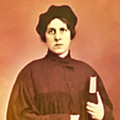Andrea Weiss is an American rabbi, author, and Associate Professor of Bible at Hebrew Union College, where she was ordained in 1993. [1]
In 2006, she published the book Figurative Language in Biblical Prose Narrative: Metaphor in the Book of Samuel (Supplements to Vetus Testamentum). [2] She was associate editor of The Torah: A Women’s Commentary, which won the 2008 Jewish Book of the Year Award from the Jewish Book Council. [3] She was once a student of Tamara Cohn Eskenazi, who was the chief editor of the book. [4]
Weiss gave the 2012 Goodman Lecture at St. Catherine's University on "Ancient Words, New Voices: The Story of The Torah—A Women’s Commentary. [5]
The Center for American Progress named Weiss as a faith leader to watch in 2018 because of her efforts to highlight the voices of a diverse set of religious scholars. [6]
The 2022 art exhibit “Holy Sparks”, shown among other places at the Dr. Bernard Heller Museum, featured art about twenty-four female rabbis who were firsts in some way; [7] [8] Debbie Teicholz Guedalia created the artwork about Weiss that was in that exhibit. [9]
This page is based on this
Wikipedia article Text is available under the
CC BY-SA 4.0 license; additional terms may apply.
Images, videos and audio are available under their respective licenses.
